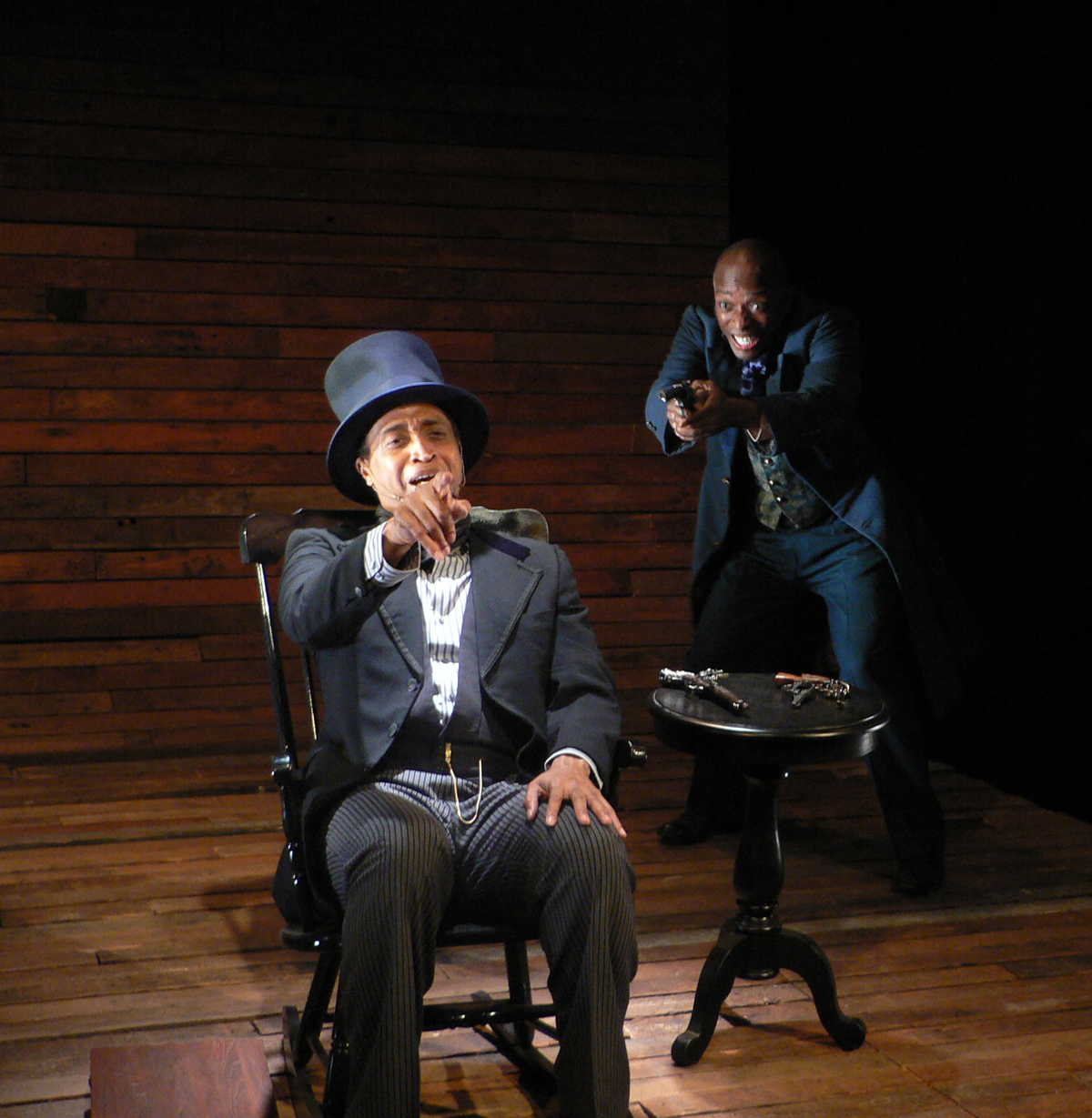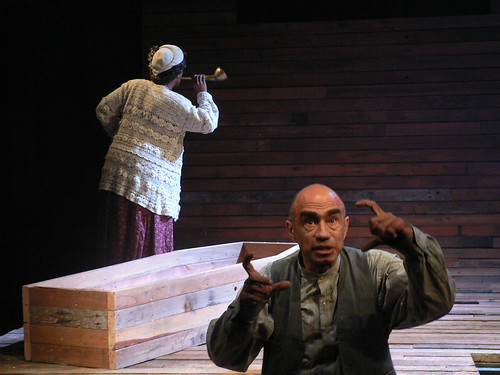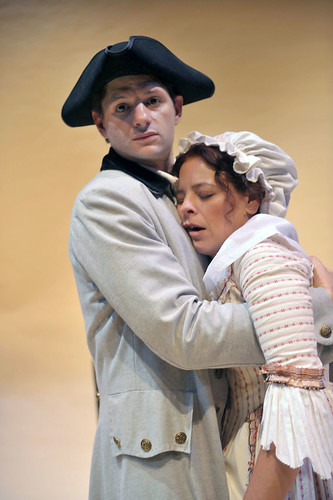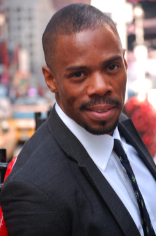
Theatergoing in the San Francisco Bay Area is one of life’s treats. No question about it. If you love theater, this is a wonderland. In this devastating economic climate, may that only hold true for the next couple of years.
There is so much good theater here, so many incredible actors, writers, directors and crafts people that an annual Top 10 is often difficult to wrangle. That’s why the Top 10 is followed by a list of other shows that should, by all rights, also be included in the Top 10, but numbers being the chronological beasts that they are, dictate on show per number (still, I cheated with No. 6 and included two shows by one playwright).
1. TheatreWorks’ Caroline, or Change by Tony Kushner and Jeanine Tesori – My favorite show of the year peeled yet another layer of this incredible musical to reveal a work of sheer genius. Director Robert Kelly and his extraordinary leading lady, C. Kelly Wright, offered some of their best work ever, and that’s saying something.
2. California Shakespeare Theater’s Pericles – Adapted and directed by Joel Sass, this incredibly colorful telling of one of Shakespeare’s oddest tales was entrancing and memorable, especially on a warm summer night in the gorgeous Bruns Amphitheatre in Ordina.
3. Campo Santo and Intersection for the Arts’ Angry Black White Boy adapted by Dan Wolf from Adam Mansbach’s novel – The year’s most exciting new work was a bold act of contemporary theatricality, blending hip-hop, spoken word, drama and movement into a seamless blend directed by Sean San Jose. Good news for anyone who missed it – the show returns to Intersection Jan. 29-Feb. 15.
4. SF Playhouse’s Abraham Lincoln’s Big Gay Dance Party by Aaron Loeb – We had to wait all year for a world-premiere play that entertained as much as it titillated and thrilled. Funny, serious and wacky, this Chris Smith-directed musing on a divided America proved to be as smart as it is imaginative.
5. Traveling Jewish Theater and Thick Description’s Dead Mother, Or Shirley Not All in Vain by David Greenspan — Weird and wild barely begins to describe this play about a gay son who essentially becomes his dead mother. Outstanding, memory-searing performances came from Liam Vincent and Deb Fink in Tony Kelly’s production.
6. SF Playhouse’s Shining City and Marin Theatre Company’s The Seafarer, both by Conor McPherson – Ireland’s top-tier playwright received two outstanding productions by local theaters, each demonstrated his compassionate (and slightly warped) humanity.
7. Shotgun Players and Banana, Bag & Bodice’s Beowulf – This rock musical take on one of college lit’s greatest hits was one of the year’s most delightful surprises. Composer Dave Malloy and writer Jason Craig breathed new life into an Old English classic. This one comes back for one performance only, Jan. 8, at Berkeley Repertory Theatre’s Roda Theatre, before heading out to conquer New York.
8. Berkeley Repertory Theatre’s TRAGEDY: a tragedy by Will Eno – Audiences were sharply divided over this existential dark night of the soul as filtered through a TV news team. I loved its Beckettian aridness and humor, and Les Waters’ production was anchored by an outstanding cast.
9. Magic Theatre’s Octopus by Steve Yockey – Water poured and unease flowed in director by Kate Warner’s splashy production of a challenging, unnerving play in which death and disease ooze into every nook and cranny.
10. American Conservatory Theater’s Rock ‘n’ Roll by Tom Stoppard – ACT often does its best work with Stoppard, and this was on exception. Director Carey Perloff revealed the rich rewards of this dense, emotional work.
And now a few other greats in no particular order: Theatre Rhinoceros’ Ishi: The Last of the Yahi by John Fisher; Cal Shakes’ An Ideal Husband by Oscar Wilde; Magic Theatre’s Evie’s Waltz by Carter W. Lewis; SF Playhouse’s Bug by Tracy Letts; Word for Word’s Sonny’s Blues by James Baldwin; Aurora Theatre Company’s The Busy World Is Hushed by Keith Bunin; ACT’s The Quality of Life by Jane Anderson; Berkeley Repertory Theatre’s The Arabian Nights by Mary Zimmerman; Aurora Theatre Company’s The Best Man by Gore Vidal.
It was quite a year for excellent solo shows as well. Here are some highlights: Nilaja Sun’s No Child… at Berkeley Rep; Colman Domingo’s A Boy and His Soul at Thick Description; Roger Rees’ What You Will at ACT; Ann Randolph’s Squeeze Box at The Marsh; Carrie Fisher’s Wishful Drinking at Berkeley Rep; Judy Gold’s 25 Questions for a Jewish Mother at the Marines Memorial Theatre; Billy Connolly live at the Post Street Theatre; Mark Nadler’s Russian on the Side at the Marines.
And, it has to be said, not everything is genius. Here are shows that lingered less than fondly in memory: Darren Romeo’s The Voice of Magic at the Post Street Theatre; Nikolai Gogol’s The Government Inspector at ACT; Cybill Shepherd in Bobby Goldman’s Curvy Widow at the Post Street Theatre; Edna O’Brien’s Tir na nOg (Land of Youth) at the Magic Theatre.



 The Aurora Theatre Company’s next show, George Bernard Shaw’s The Devil’s Disciple, is packed with the kind of actors who, if you care about local theater, you’ve been watching for years. Names such as Stacy Ross, Warren David Keith and Trish Mullholland pretty much make a show worth seeing if they’re involved.
The Aurora Theatre Company’s next show, George Bernard Shaw’s The Devil’s Disciple, is packed with the kind of actors who, if you care about local theater, you’ve been watching for years. Names such as Stacy Ross, Warren David Keith and Trish Mullholland pretty much make a show worth seeing if they’re involved.
 “I cannot thank my son enough,” Marin says. “He’s had to sit in a lot of green rooms. He’s the light of my life. What’s interesting, is when I bow, I make an `M’ with my hands, and if he’s in the green room, he’ll run out to the wings to see if I give him thanks. I couldn’t act if he wasn’t on board.”
“I cannot thank my son enough,” Marin says. “He’s had to sit in a lot of green rooms. He’s the light of my life. What’s interesting, is when I bow, I make an `M’ with my hands, and if he’s in the green room, he’ll run out to the wings to see if I give him thanks. I couldn’t act if he wasn’t on board.”




 In addition to work done at the New York Theatre Workshop and recent re-writes with Kelly in New York, Domingo says the piece has deepened with the loss of his parents in the last two years.
In addition to work done at the New York Theatre Workshop and recent re-writes with Kelly in New York, Domingo says the piece has deepened with the loss of his parents in the last two years.




